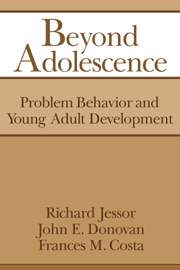Preface
Published online by Cambridge University Press: 07 October 2009
Summary
It was over three decades ago, in 1959, that the psychosocial framework for this book was first elaborated. Over the past thirty years, we have continued to refine that framework, now called Problem-Behavior Theory, and have written and published numerous articles, chapters, and two previous books about it. The present book is the latest addition to the corpus of systematic research that has emerged from our endeavors. This ongoing exploration of a set of ideas has yielded, for us, a strong sense of cumulativeness, and that is one of its main satisfactions. It has also been gratifying to see that others have found those same ideas useful in the pursuit of their own inquiries.
Although the visible thread that winds through the larger fabric of our research is a continuing concern with problem behavior, we have used that concern to try to illuminate some of the fundamental issues in contemporary behavioral science: how to conceptualize the person, the environment, and their interaction in a way that is logically coherent; how to capture the texture of complex social behavior; how to formulate psychosocial development within the framework of a theory of action; and how to bridge the gap between description and explanation. This volume again deals with problem behavior, and again fundamental issues are explored, including the structure and organization of social behavior, the stability and continuity of personality, the description of development in the language of theory, the role of past experience in shaping subsequent growth and change, and others.
- Type
- Chapter
- Information
- Beyond AdolescenceProblem Behaviour and Young Adult Development, pp. xiii - xviPublisher: Cambridge University PressPrint publication year: 1992

